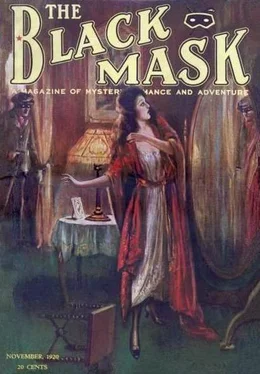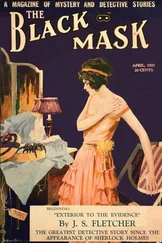Hamilton Craigie - The Black Mask Magazine (Vol. 2, No. 2 — November 1920)
Здесь есть возможность читать онлайн «Hamilton Craigie - The Black Mask Magazine (Vol. 2, No. 2 — November 1920)» весь текст электронной книги совершенно бесплатно (целиком полную версию без сокращений). В некоторых случаях можно слушать аудио, скачать через торрент в формате fb2 и присутствует краткое содержание. Город: New York, Год выпуска: 1920, Издательство: Pro-distributors Publishing Company, Жанр: Классический детектив, на английском языке. Описание произведения, (предисловие) а так же отзывы посетителей доступны на портале библиотеки ЛибКат.
- Название:The Black Mask Magazine (Vol. 2, No. 2 — November 1920)
- Автор:
- Издательство:Pro-distributors Publishing Company
- Жанр:
- Год:1920
- Город:New York
- ISBN:нет данных
- Рейтинг книги:5 / 5. Голосов: 1
-
Избранное:Добавить в избранное
- Отзывы:
-
Ваша оценка:
- 100
- 1
- 2
- 3
- 4
- 5
The Black Mask Magazine (Vol. 2, No. 2 — November 1920): краткое содержание, описание и аннотация
Предлагаем к чтению аннотацию, описание, краткое содержание или предисловие (зависит от того, что написал сам автор книги «The Black Mask Magazine (Vol. 2, No. 2 — November 1920)»). Если вы не нашли необходимую информацию о книге — напишите в комментариях, мы постараемся отыскать её.
The Black Mask Magazine (Vol. 2, No. 2 — November 1920) — читать онлайн бесплатно полную книгу (весь текст) целиком
Ниже представлен текст книги, разбитый по страницам. Система сохранения места последней прочитанной страницы, позволяет с удобством читать онлайн бесплатно книгу «The Black Mask Magazine (Vol. 2, No. 2 — November 1920)», без необходимости каждый раз заново искать на чём Вы остановились. Поставьте закладку, и сможете в любой момент перейти на страницу, на которой закончили чтение.
Интервал:
Закладка:
She stopped, and covered her face with her quivering hands.
Bailey patted the old lady’s shoulder reassuringly, and after a moment she continued:
“I don’t know what time it was when I woke up. The lights cast only a dim blue haze over the compartment. I was a little dazed at first. I rubbed my eyes, and saw—saw Monsieur Bertal. He was sitting up very straight, his head tilted back against the cushion, his eyes staring at the ceiling. Then I saw the slash across his throat, and the b-blood soaking his shirt and vest, I screamed—and screamed. Monsieur Robert woke up, and asked me what was the matter. But I fainted—
“A peculiar case,” said the prefect; “we have absolutely no clue. If monsieur would help—”
Bailey nodded. “I’ll be glad to. It is necessary for me to cable the chief at once, but I will return and do all I can. Though I hope we can catch the murderer of Beau Nash, he has certainly done the world no harm in ridding it of that gentleman.”
Once more on the Rue Cannabiere, the American paused. He would probably be ordered home very shortly, and in the short time left him he would have to persuade Denise to marry him and accompany him to America.
Though he had known the girl for almost a year, he knew little or nothing of her family and antecedents. She was very beautiful, apparently had sufficient money for all her needs, was well educated and well bred. Also, she found it necessary to make trips to Paris every two weeks. That completed Denise Girard’s dossier so far as William Bailey was concerned.
It was sufficient that he loved her.
He walked as far as the Cours Saint Louis. There he swung aboard a tram-car, and after fifteen minutes’ ride dropped off opposite the marble grandeur of the Palais Longchamp. Denise’s apartment was very near.
Pondering there in the June sunshine as to the best course he should pursue, Bill Bailey received the greatest shock of his eventful life.
Denise came down the steps of her house, arm in arm with Beau Nash!
The drooping mustache, the graying yellow hair was that of the corpse who lay on the slab in the mortuary of the prefecture of police. And who could doubt from the stately and dangerous walk, from his eyes—so ice-cold, so fire-hot—from his deadly air of a bravo of fortune, that Nash was very sure of himself.
Apparently the pair did not see him. They walked down the street, talking earnestly. Bailey shook off his numbed surprise, and followed them. A question kept hammering in his brain. What was Denise doing with the Beau? What possible connection could his little sweetheart have with the most notorious criminal in Europe?
III
Bailey could have arrested Nash then and there, but the human instinct to find out what Denise was doing with this man overrode his first impulse to take the fellow into custody. They were in no hurry, made no effort at concealment, and Bailey, sheltered by the flowing stream of pedestrians, kept within easy reach of them.
At length they turned into the Place Moreau. It was market day, and even though late in the afternoon, the square was crowded. Sabots clattered on the cobble-stones; hogs squealed, ducks squawked; red-faced peasant women shouted prices for their fish and fowl and vegetables. Here wandered a steel helmeted poilu or a brown Tommy, there a pigeon-chested gendarme, flecks of color in the dull mass.
As Bailey started to cross the square three men stepped in his path. They were Parisians, of Montmartre or the outer boulevards. The cut of their clothes, a swagger from the hips and an unhealthy color proved that. They stopped him effectively without apparently attempting such a thing.
“Hello, American,” whined one. “We desire only the small courtesy of a match.”
“I’m in a hurry,” Bailey snapped, thrusting the spokesman to one side. “Get out of the way.”
Every bit of color fled from the apache’s face; his lips tightened into a white gash, and there was such malignant hatred in his eyes that Bailey’s hand involuntarily reached toward his hip. If ever murder was written in? a human expression it was there in the Frenchman’s. Then the agent laughed, reached over and grasped the fellow’s wrist and twisted it until he howled with pain. The others, being cowards at heart, surged back. Bailey hurried across the square. But in the moment the Parisians had engaged his attention, Nash and Denise had disappeared.
Bailey was not a man to cry over spilt milk, but he was thoroughly disgusted at the turn affairs had taken. Much as he wanted to allow Nash further liberty so that he could discover the relationship between him and Denise it had become imperative to get the man under lock and key.
He telephoned to Captain Goulet, the prefect. It was Bailey’s plan to have a drag-net thrown around the city in the event of Nash’s attempting to slip out, and also to have the Place Moreau quarter thoroughly searched at once.
“Yes?” came Captain Goulet’s voice over the wire.
“This is Bailey.”
“Oh, Monsieur Bailey, I have the most—”
“Just a moment, Captain. You remember that I identified the man who was murdered on the Marseilles express as Beau Nash. Shortly after leaving your office I saw Nash on the street, but he gave me the slip—”
“You—you saw Nash on the street?” asked the captain thickly. “Oh, mon Dieu! This matter is getting beyond our mortal bonds.”
“What do you mean?”
“The body of the man you identified as Nash has disappeared from the table in the mortuary!”
Bailey sucked in his breath In a gasp of surprise.
“Disappeared?”
“Of a certainty.”
“And I saw Nash in the street five minutes afterward. I wonder—”
“Did you—did you notice his throat, monsieur?”
“He wore a muffler,” said Bailey impatiently, “wrapped in two or three folds around his neck.”
“Then it was him,” wailed the prefect. “I fear nothing human, monsieur, but this has gotten beyond our realm. The man who lay on this table was as dead as Pontius Pilate—to that I’ll swear. Yet he disappears from my mortuary, and you meet him on the street. What can one do against a cadaver, monsieur?”
“Nonsense. Have all the stations and wharves watched, and send a dozen men down here to search the neighborhood, Dead or alive, we’re going to get Beau Nash. And I think that he will be able to tell us a few things to clear up the mystery of the Marseilles express. Will you do as I ask?”
“At once, monsieur.”
Bailey thoughtfully hung up the receiver, and walked again into the Place Moreau.
The shadows had lengthened. The hucksters in the square were packing up their stands and wares. In ten minutes more the place would be deserted, and then the police would come down like the historic Assyrian wolves—probably with as small success.
Looking up from his musings, Bailey saw Denise step out of a taverne on the farther side of the square. She looked around cautiously. Then, having reconnoitered the ground to her evident satisfaction, she went back into the house. Bailey ran across the street, shifting his revolver from his hip pocket to the side one of his coat.
The entrance from which Denise had looked did not lead through the café, but directly up a flight of stairs to the second floor. Its door was unlocked, and the agent pushed it open and went in.
No one there.
With his hand on the butt of his weapon, Bailey went up. Under his cautious step the ratty old stairway squeaked like an unoiled hinge. The place was dark as a well, and rank with the thousand odors of a cheap restaurant. Somewhere above lay the key to the most puzzling mystery that Bailey had ever investigated.
At the head of the second flight a gas jet burned blue in the foul air. Within the arc of its sickly radiance the portal of a room swung slightly ajar. He tiptoed forward, and urged the door open an inch or more. Every muscle in his body was tensed for the possible struggle.
Читать дальшеИнтервал:
Закладка:
Похожие книги на «The Black Mask Magazine (Vol. 2, No. 2 — November 1920)»
Представляем Вашему вниманию похожие книги на «The Black Mask Magazine (Vol. 2, No. 2 — November 1920)» списком для выбора. Мы отобрали схожую по названию и смыслу литературу в надежде предоставить читателям больше вариантов отыскать новые, интересные, ещё непрочитанные произведения.
Обсуждение, отзывы о книге «The Black Mask Magazine (Vol. 2, No. 2 — November 1920)» и просто собственные мнения читателей. Оставьте ваши комментарии, напишите, что Вы думаете о произведении, его смысле или главных героях. Укажите что конкретно понравилось, а что нет, и почему Вы так считаете.












